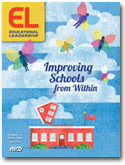Research Alert
Principal Evaluation
American Institutes for Research (AIR) offers a new framework to help principals develop their goals and reflect on their practices. The five essential practices include building a shared purpose, focusing on learning, managing organizational resources, collaborating with community, and leading with integrity. See Five Essential Practices of School Leadership.
Graduation Requirements
A new report by the Education Commission of the States reviews the trend toward greater flexibility in how students demonstrate proficiency. States are increasingly permitting high schools to move away from traditional course seat-time requirements and allowing competency-based assessments, grade point average, class rank, and course rigor as indicators that students are ready for college. See Multiple Measures for College Readiness.
ELLs
A report from the Education Commission of the States offers policy recommendations that states and the federal government can adopt to improve the academic performance of English language learners. The report suggests changes in five areas: finance, student identification and reclassification, educator quality, prekindergarten services, and parent and family engagement. See State-Level English Language Learner Policies.
Equity
A new report from the Jack Kent Cooke Foundation shows that bright students from high-income families are more likely to succeed in school than their equally gifted low-income peers. A lack of state policies that support students who have academic potential but lack financial means is contributing to this "excellence gap." See Equal Talents, Unequal Opportunities: A Report Card on State Support for Academically Talented Low-Income Students.
Online Only
A Lesson That Lasts a Lifetime
In the World's Largest Lesson, developed by the United Nations and UNICEF, millions of teachers across the globe were recently called on to create and share lesson plans for teaching the U.N.'s Sustainable Development Goals. The goals focus on the most crucial issues that will affect humanity over the next 15 years—such as reducing poverty, ensuring health and well-being, achieving gender equality, building resilient infrastructure, and addressing climate change.
In September, these learning resources will be made available to the public. Teachers can use them to foster global citizenship; support student learning across a range of subject areas; and highlight such big ideas as human rights, poverty, and environmental issues.
World Spin
Finland is in the process of scrapping the traditional teaching-by-subject approach in favor of teaching by topic to better prepare students for their lives outside school. Subject-specific lessons are already being phased out for 16-year-olds in Helsinki, the city at the forefront of the reform. Instead of teaching history or economics, teachers will be called on to teach cross-subject topics like the European Union, which would merge elements of history, economics, languages, and geography.
Numbers of Note
When asked which action they would choose to improve U.S. schools, here's what U.S. adults had to say:
46: The percentage of respondents who chose "reducing class sizes."
30: The percentage of respondents who chose "buying new books and technologies."
24: The percentage of respondents who chose "increasing teacher salaries."
Source: Education Next. (2014). 2014 Education Next Survey 2014. Cambridge, MA: Author. Note: 5,266 Americans were surveyed. For this question, those surveyed were asked, "Suppose the government plans to increase spending in the school system. Which one of the following options do you favor?"
Relevant Reads
The Allure of Order: High Hopes, Dashed Expectations, and the Troubled Quest to Remake American Schooling by Jal Mehta (Oxford University Press, 2015)
Most people agree that No Child Left Behind (NCLB) didn't stimulate the widespread school improvement its architects promised. "This outcome might have been surprising if it were the first time policymakers tried to use standards, tests, and accountability to remake schooling from above. But NCLB was actually the third such movement," writes Jal Mehta. The author explores why U.S. policymakers have ignored the mixed track record of these reforms and invested high hopes again and again in the same "instruments of control."
If we learned from this history, we could avoid the mistakes of the past and design a new approach to school reform, says Mehta. In the United States, he asserts, "The entire educational sector was put together backwards." Prospective teachers receive insufficient training, are equipped with little relevant knowledge, and are often sent into challenging schools. When they don't deliver the desired results, we hold them "accountable." If we reversed this approach and put resources into teacher selection, preparation, and collaborative professional development at the front end, extensive (and ineffective) monitoring at the back end would be unnecessary.
PageTurner
"In schools that embody a culture of hope, the energy of optimism is electrifying and uplifting. It's contagious."
—Robert D. Barr and Emily L. Gibson
